Posted on January 14, 2011 by Darren
This post is part of James Bond January, being organised by the wonderful Paragraph Films. I will have reviews of all twenty-two official Bond films going on-line over the next month, and a treat or two every once in a while.
The Spy Who Loved Me was just what Bond needed after The Man With The Golden Gun. Let’s be honest here, the movie has perhaps the strongest and most iconic opening sequence of any Bond movie – even those who haven’t seen the film know the beats off by heart. Bond is skiing, escaping a Russian ambush in the snow. He’s giving as good as he gets, but he’s cornered – out numbered and outgunned. In a moment of desperation, Bond flees his attackers, skiing off the side of a cliff.

It’s a cliffhanger…
For a moment, there is nothing but silence. As the stunt man tumbles through the air, the music stops cold. It’s not just the audience holding their breath as they watch Bond enter free fall. Is this it for our illustrious secret agent? You know it can’t be more than a couple of seconds, but it seems to last an eternity. And then…
And then…

The Bond music kicks into gear as the parachute opens – a Union flag. And then the opening beats of Nobody Does It Better sound in the background as Bond makes good his escape. Let’s face it, the movie could end there and it would be the best thing to happen to Bond since Sean Connery left.

Nobody does it better…
Nobody Does It Better is just a wonderful song, and the animated title sequence is one of the best of the series. Carly Simon’s iconic Bond theme (the first not to be named for the movie it comes from – although it does include the line “like heaven above me, the spy who loved me is keeping all my secrets safe tonight”) is probably the most enduring of the series (although I love it, it’s not my personal favourite – that would by You Only Live Twice or GoldenEye. The entire animated sequence, with Bond and Russian women spies, is so perfectly James Bond that it just works incredibly well. I know that the vast majority of Bond opening titles are impressive and effect, but this one just stands out so much that it deserves attention. GoldenEye is really the next example of the perfect synergy of the music and visuals.
In fairness, it would be a pretty dull Bond movie if it ended after the opening titles, and what follows is a game of two halves. On one hand, you have the story of the courtship between Bond and his Soviet opposite number, Agent XXX. On the other, there’s the story of a generic Bond villain’s attempt to cause global extinction so that he and his underwater city can repopulate the planet. One of these plot strands is clever, interesting and insightful. The other is just a tad generic. Attempt to guess which is which.
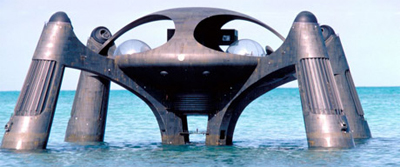
Hail, Atlantis!
The love story between Bond and Russian agent Anya Amasova is wonderful and one of the more memorable of the entire series. The best aspect of The Spy Who Loved Me is that it affords the audience a unique perspective on Bond. After ten movies, there’s a tendency to believe that we’ve seen almost everything, and that a sense of boredom might yet set in – but this film grants us a rare look at Bond through the eyes of others.
The opening sequence is, on one level, the generic Bond opening sequence – the spy is ambushed, he escapes through incredibly impressive means and kills several of his attackers. However, it also shows us a bit of back story to one of these otherwise nameless goons. We learn that the man Bond shot and killed had a lover, one that he left to take part in this ambush, and one who will never see him again. We know that he was trying to kill Bond – we know that Bond killed him in self-defence – and we accept Bond’s justification that “in our business, people get killed” when he offers it later on.

They’re “partners”, you see…
The truth is that – were he not confronted about it by Anya later in the movie – Bond wouldn’t dwell upon that death in the heat of combat, and neither would the audience. “When somebody’s behind you on skis at forty miles an hour trying to put a bullet in your back,” he explains, “you don’t always have time to remember a face.” This scene would undoubted provide the source material for the henchmen-related cutaway gags in Austin Powers, but it’s effective here at illustrating that the Russian spies don’t exist simply for Bond to mow them down. Well, except that they do – given this is a work of fiction and he singlehandedly kills a few dozen other nameless mooks before the film over – but you get what I mean.
Later on, we’re presented with Anya’s perspective in Bond. For example, we’re treated to a shot of Bond and Q in the distance, probably explaining the gadgets from this film and trading witty remarks (though we cannot hear them). It creates an effective illustration of how strange the usual tropes and clichés of a Bond movie must seem to those unfamiliar with the storytelling devices.

The Russians are Bach…
Similarly, we also get to see the behind-the-scenes preparation Bond has put into seducing his Russian counterpart – he makes a pass at her, she flirts in response, but turns him down. We see Bond retiring to his cabin, with two empty glasses and a bottle of champagne on ice – it looks smooth and sophisticated when he succeeds at charming a woman into his bed, but look pathetic and lonely when he returns alone. We later see Bond waiting patiently by the door for her to buckle and join him for some “liaising”, as it were – he eventually grows so tired he even loosens his tie a little bit. The effect – she’d come through the door and find him waiting – would be charming if it all played out, but it looks needy and insecure when we see that she isn’t coming.
The movie is at its best when it plays Moore off against his KGB counterpart in the first half of the film, as both compete for the MacGuffin. This is the kind of stuff which plays to Moore’s strength in the role. He’s undoubtedly a lighter Bond, and one which seems far less cynical than most of the other actors to have taken the role over the years, which works well here. I don’t think I could ever believe, for example, that Connery’s version of the character could generate a mutual attraction with Anya, especially when she vows to kill him for the death of her beloved – Connery would probably still sleep with her, but it would seem cold and calculated, a cynical and exploitive ploy. With Moore, there’s a sense that the character’s heart is on his sleeve for all to see. Of course, his decision to go back for Anya at the movie’s climax is completely nuts, but Moore plays Bond as more of a suave adventurer than a cold-hearted secret agent, so it fits with the movie and the character. Which is great – this is a great Bond movie that could only work with Moore.
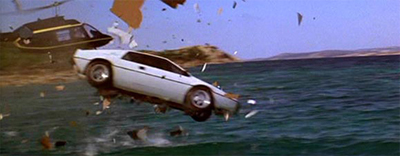
Just when it felt like the quality of the films took a dive, they release this gem…
A lot of people seem to praise Barbara Bach’s performance, but I have to be honest – I don’t see it. The character is absolutely fascinating, and a perfect match for Bond, but I’m not sold on the actress. In watching their scenes together, her delivery (which seems to drift in and out of a Russian accent) seems awkward and stilted, like Roger Moore himself is providing the chemistry for the pair of them. She’s certainly not as weak as the vast majority of Moore’s Bond girls, but I didn’t find her particularly superb. If it wasn’t for the character’s superb hook (“a British agent in love with a Russian agent,” the movie’s villain, Stromberg, observes at one point, “détente indeed”), I doubt she’d be remarkable at all.
Although the relationship between the two forms the movie’s backbone – and provides its most interesting plot – there’s more going on. Somebody is plotting against Russian and British submarines, and is hatching their own diabolical plans for world domination. It is Bond-by-numbers essentially, but it probably represents the finest example of a “Roger Moore style” Bond film, if that doesn’t sound too harsh (it probably does).
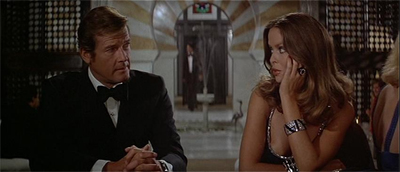
Bond’s always Russian to bed…
What I mean by that, is that there’s any number of ridiculous and over-the-top elements, but that they hold together much better here than they do in the other Roger Moore films. While For Your Eyes Only represented an attempt to cast Roger Moore in a Sean-Connery-esque Bond film and ended up with very mixed results, The Spy Who Loved Me feels like a Roger Moore film, through and through – but it’s a damn entertaining one, rather than an irritating one.
All the standard ingredients are included. The underwater car is surely one of the more ridiculous Bond gadgets ever assembled. We’re treated to awkward physical comedy when the big bad guy’s villanous henchman drops a huge rock in frustration – accidentally crushing his toes. The villain has yet another elaborate base seemingly built off the plans that Blofeld used in You Only Live Twice (obviously being the first Bond villain to survive an encounter with the character means that your design choices carry weight), complete with obligatory monorail. There is a ship that eats submarines. There’s also a remixed version of the Bond theme (called Bond ’77) which sounds like the producers listened once too often to the BeeGees You Should Be Dancing.
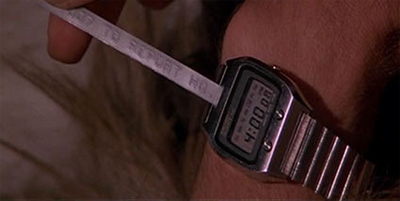
Nuclear apocalypse? Not on Bond’s watch!
However, director Lewis Gilbert does great work with what he has. The scene in Giza with the lightshow – as the henchman Jaws shifts around as the lights fade on and off – should be hokey as hell, but Gilbert makes it seem creepy and menacing. One minute he’s there and the next he’s gone. Similarly, Stromberg is no less than the third Bond villain to keep sharks (I kinda want to think they’re just the same sharks, passed from villain-to-villain like a weird inheritance scheme), but the stylised use of Bach’s Air on the G String makes the sequence seem eerie rather than overly derivative.
And then there’s Jaws. Jaws is the ultimate novelty henchman. He really shouldn’t work – his gimmick is that he’s really tall, has metal teeth, and is too stubborn to die. By all accounts, he’s an explosion of cheesiness waiting to happen. And, while there are traces of that to be found in the movie, Lewis Gilbert somehow manages to contain the potential damage and – what’s more – actually make the character seem menacing. That scene with Anya and Bond at the temple in Egypt is effective and thrilling. Of course, Jaws would eventually implode under his own weight when he returned in Moonraker, where he turned into as big a joke as he arguably should have been the first time around, but here he’s effective.
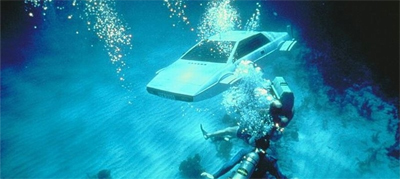
Bond’s plan goes swimmingly…
Unfortunately, Stromberg’s plot for world domination is fairly dull when it takes over in the second half of the movie. A lot of the energy of the first half is gone – the fact that Bond and Anya spend much of the climax separated and she reverts to the traditional “damsel in distress” role probably contribute to that sense. There’s also the fact that the climax seems unnaturally protracted – it just can’t maintain the suspense long enough for Bond to move through each of the three action finales (take over Stromberg’s boat, prevent nuclear holocaust, infiltrate Atlantis).
Still, that’s a relatively minor complaint. Moore has really grown into the role – he’s still by far the lightest Bond, but there’s a bit of nuance and depth creeping into his portrayal. He appears in this film as a much more competent operative than in his two earlier instalments – be the fight outside the tomb at Gaza with two hired goons, or his rather cold dispatching of a henchman from a Cairo rooftop. You know a moment is pretty cold-blooded when Daniel Craig emulates it in Quantum of Solace (although in that film, Bond is holding the henchman’s tie rather than the other way around). There’s nothing quite as vicious as that moment in For Your Eyes Only where he kicks a car off a cliff, but it’s a lot easier to think of Moore as a secret agent here than in any of the other films (again, with the exception of For Your Eyes Only).

Where’s the flux capacitor?
The Spy Who Loved Me is perhaps the strongest instalment of Roger Moore’s time in the role (although I have a soft spot for For Your Eyes Only), and perhaps the best example of what a film starring Roger Moore could look like, if done right. It balances the humour and action a lot better than the films around – while still somewhat goofier than any other actor in the role, Moore actually seems like a guy that the British government would trust to do stuff.
We have complete reviews of all of the Roger Moore films available, if you are interested:
The following bloggers have written reviews of this film as part of James Bond January:
Filed under: Non-Review Reviews | Tagged: Anya Amasova, barbara bach, bond, Bonds, films, GoldenEye, james bond, james bond january, List of James Bond villains, Man With The Golden Gun, Movies, nobody does it better, non-review review, review, sean connery, Spy Who Loved Me, the spy who loved me |































Of the pre Daniel Craig movies this is my favourite Bond film. It was the only one we saw at the cinema as a kid so it has some fond memories in that respect. And Mrs Ringo Starr looks stunning.
It’s the most Roger Moore of the Roger Moore Bond films. Oddly enough, though, I much prefer For Your Eyes Only.